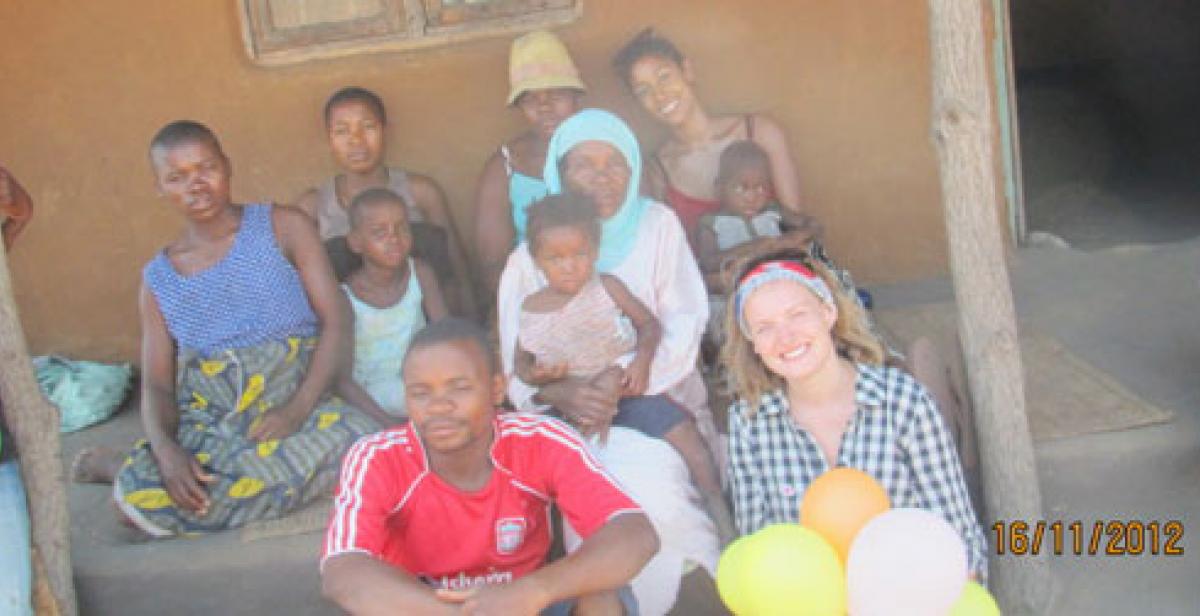Last week we spent 3 days living in Milie village in the hope of further deepening our understanding of Malawian life. Five weeks into our placement we had had many fantastic experiences working with the communities around Salima. However in order to understand and integrate with those communities even more we felt that it was necessary to go one step further than this and actually live with those communities. After proposing this to Environment Africa and the in country Progressio staff, we got the go ahead!
Armed with a solid risk assessment, we went like excited children into Milie village, our home for the next three days. We would be staying with host families in groups of two –each house to host one UK volunteer and one Malawian volunteer. However due to the uneven balance in our group, two of us (myself and Eleanor) would be without a local volunteer! Racking our brains for all the Chichewa we had picked up over the past two months we went (slightly nervously) to meet our host family. We needn’t have worried at all. Our family greeted us with the kind of warmth and kindness you would expect only from your own family. With our broken Chichewa and lots of dramatic hand movements we managed to get off to a great start. After 10 minutes of unpacking our things we were sitting in the back yard of our new family’s house – eating mangoes and talking with our family. In Malawi offering a guest a mango is the equivalent to a cup of tea and biscuits. The rest of the afternoon was spent eating more mangoes, playing games and singing and dancing (we quickly found out that singing and dancing transcend all language barriers and the two became a regular feature of our lives in Milie).
As we sat and got to know our family, a steady stream of aunts, uncles and neighbours dropped by to talk with us. We were both struck by the sense of community that there was in this village. People could freely walk in and out of each others houses, everyone knew one another and if someone needed help with something there was always a friendly neighbour happy to do the job. This sense of selflessness, kindness and group consciousness was perhaps what struck us the most during our stay. You got the impression that no one would ever be left to struggle and suffer on their own, because the entire community felt responsible for each other. We all agreed that this sense of community is something that we rarely see in the UK, and so it was a really special thing to be a part of. We left resolute that this kind of community spirit was something we wanted to try and bring home.
What else struck us was how tiring and arduous in village life was. By 7 am, Eleanor and I had already helped our new sisters with the household chores; this included carrying 40 litres of water on our head from the borehole to our house, milking a cow, cooking breakfast and cleaning the house. By 12pm we had taught an English class to nursery children alongside the village teachers, helped to build a toilet for one of our neighbours, prepared lunch and carried another 40 litres of water on our head. We were exhausted by lunch! We soon learnt that in village life survival is everything. The entire day’s activities were geared towards the basic tasks needed to function – cooking, farming, cleaning and looking after children.
Later we learnt that almost the entire village was female as most of the men had migrated to South Africa to earn money for their families. In terms of belongings, our family possessed almost nothing beyond the extremely basic household items and clothing. Many families were not able to afford to send their children to school. An education, we learnt from our family, was a luxury, and sadly a luxury that many people cannot afford. Although there was endless laughter and fun throughout our stay knowing this was very difficult for us. In many ways we felt helpless. Helpless to solve the financial issues that, although rarely spoken of, were ever present beneath the surface. We have been exposed to the often devastating poverty within these villages through our activities throughout our placement. However, I feel that this stay really confirmed for us the importance of the work NGOs like Environment Africa are doing. Small but powerful projects can be the difference between those communities suffering from the effects of climate change, and those able to withstand it and continue moving forward. We once again felt fortunate to be a part of the kind of work that might change someone’s life; but more than anything we felt fortunate that we were able to learn from the families that we lived and worked with. Even in the face of such challenges they approached everything with such a spirit of happiness and generosity. I can honestly say that I have met just a handful of people who have inspired me in such a way. The experience not only allowed us to understand Malawian culture on a deeper level but also touched us deeply on a personal level, and will be with us forever.
Blog by: Holly Phillips




Comments
Holly keeping up with your
Holly keeping up with your blogs very warming to hear about there sence of togatherness in the village! U will inspire 100's maybe even 1000's in ur life time. such a star! Keep it up can't wait to hear more when get bk stay safe x